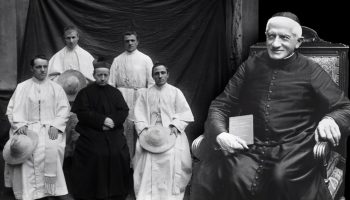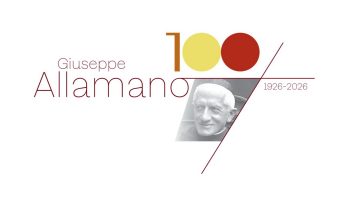
Animated by his apostolic zeal and having understood the mission of the Church, St. Joseph Allamano concerned himself with the entire world. He felt the urgency of carrying the gospel to the ends of the earth. In his observation, there were many organizations in the Church devoted to charity, but few dedicated to the mission.
By Edgar Nyangiya *
To remedy the situation, after a long spiritual preparation, mixed with obstacles and challenges, on January 29th, 1901, he founded the Consolata Missionary congregation of fathers and brothers.
In his vision, the Founder had foreseen that, as the fathers would engage in pastoral work, brothers would help in creating the structural facilities needed for the mission. They would be co-workers in the mission. The work done by these brothers in some missions can be admired even today.
Bro. Vincenzo Clerici

During the annual retreat of the Consolata missionaries in Ethiopia in Modjo, I got to interact with Bro. Vincenzo Clerici, 84 years old, and the only religious Consolata brother in Ethiopia. My intention being, trying to understand how his journey has been as a religious brother in the Consolata congregation.
Born in Italy in 1940, Bro. Vincenzo grew up like any other young man. He graduated in Physics and worked as a teacher in a government run Technical school.
Conversing with him, he confesses that his journey towards joining Consolata was special in a way. At first he travelled to the mission as a lay young man. The term volunteer was not in use then. Young people from Italy were moving to third world countries (as they were called then) to have an experience there. He notes that his very first experience happened to be a missionary one, with the Consolata missionaries.
Back in Italy, he joined a group of four young men who would go every month to the “Casa Madre”in Turin, due to the interest that they had for the third world country, and the adventure it involved. There, they were accompanied by Fr. Giuseppe Caffaratto who acted as their instructor. When the time came, his colleagues were sent to Brazil-Amazonia, and on his part he was sent to Kenya.
In Kenya, when he arrived, there was what he referred to as a “Boom” of the schools. Fr. Giovanni De Marchi who was already in Kenya, encouraged him to learn English. So, he had to travel to England, where he found a job to sustain him and stayed there for one year as he took English classes. Going back to Kenya after the language course, he was sent to Mugoiri mission near Murang’a, where he worked as a teacher in the secondary school that later transitioned to Mugoiri boys and girls secondary school.
As a lay young man, one would ask how he was sustaining himself economically. Fr. Cesare Facchinello who was the father in charge in Mugoiri, organized for the school to pay him a salary. Of which, half of the salary went to the mission for his maintenance and half for his personal needs. Since it was a moment of experience, he was relocated to Sagana where he met five Consolata brothers among them being Bro. Sandro and Bro. Adriano. Living with these brothers in Sagana, doing the same job, same timetable, sharing their life experiences together made him decide that he would become one of them; a religious brother.
Following his decision, he was admitted into Postulancy in Sagana and then later sent to Certosa for his Novitiate by the then superior Fr. Giuseppe Inverardi. Here, he joined a group of candidates to the priesthood, being the only brother candidate. After his novitiate, he was sent back to Sagana as a Consolata religious Brother.

After his first experience as a religious in Sagana, Bro. Vincenzo was destined to Ethiopia where he worked for seven years before he was recalled back to Kenya, in Langata, a community of brothers where he worked as a formator. Two years later he was again back to Ethiopia. Since then, Ethiopia has been his home in his ministry as a brother.
Vocation to brotherhood in his early days
Bro. Vincenzo recalls that Brothers in his early days engaged each other in learning new technical skills. They ensured that they walked together as well as helping each other. From his day to day observations, he could tell that they enjoyed doing their duties passionately, be it in carpentry, masonry, mechanics and those many other technical skills. He singles out Bro. Mario Bernardi who became so influential to him. He taught carpentry but he was equally very pastoral oriented. He notes that, Bro. Mario was instrumental in the life of the brothers in Kenya; because of his time to time encouragement.

In Ethiopia, the brothers passionately worked in the missions and technical schools. For instance, he remembers Meki technical school where he was posted. Apart from teaching, he ensured the supplies (materials for carpentry, metal work etc) were always available. He recalls working with Fr. Michele Brizio (of good memories) who was the director and he was his vice. Later on despite the hard work and effort put there, they had to handover the technical school to the local prefecture.
He generally noted that brothers during those days were driven by the passion for the mission and love of the work they were doing. Not only did they use their technical knowledge and skills, but they also engaged themselves in pastoral work. He has beautiful memories of Gambo mission, visiting Christian families and Leprosy victims, consoling them and even praying with them.

Decreasing number of IMC brothers
Seeking his opinion on why the number of brothers is going down in the IMC family, Bro. Vincenzo seemed to be in deep thoughts. He then pointed out that most of the brothers are advanced in age and many have died. On the other hand, the aspirants to brotherhood are very few.
He further noted that society has contributed greatly in the decrease of this vocation, in the sense that, what brothers used to do as trained specialists, now there are many people who are trained in the same fields, and they may not be brothers. But he doesn’t consider this to be really a strong argument.
He sadly noted that some brothers feel that priests are against the vocation to brotherhood. That some priests will rather encourage young men to join priestly vocation as opposed to encouraging them to the vocation of brotherhood.

His encouragement
Bro. Vincenzo is strongly convinced that the vocation to brotherhood is still a very good and noble one, that serves many people in the society in very many different fields. However, because of the skills and professionalism involved in this vocation, young people are discouraged, preferring money rather than the service offered to humanity. This greed for money and positions has made the world to be like a fighting game for survival.
In order to get more vocations, Brother advises that we as the Consolata family (Brothers, priests, sisters and lay missionaries) should encourage and motivate the already professed brothers and aspirants. More propaganda and animation should be done to show young people that this vocation is still relevant in the Church. Making the roles of the brothers attractive to the aspirants.
To the professed brothers in the family, he confidently stressed that there are more advantages of community life and brotherhood that they should love and embrace in this vocation. They should not take these advantages for granted. In his own words he states that, “one may not get more money as the world may dictate, but there are more advantages and joy in being a brother than the few disadvantages accompanying this vocation”.
Bro. Vincenzo concluded his sharing by holding that, despite his age, he still feels fulfilled and happy as a religious brother and has no regrets in following this line of call. If he could be young again and given a chance to choose, he will still choose to be a Consolata religious Brother.
Currently, Brother works in Modjo Catholic mission side by side with other community members.
* Father Edgar Nyangiya, IMC, Region of Ethiopia.




